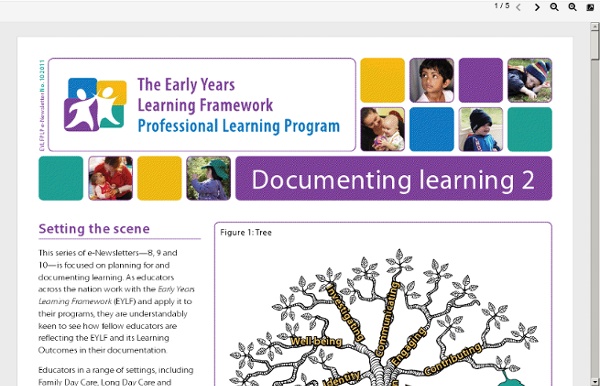



Learning with technology for pre-service early childhood teachers (Free full-text available) Anne Campbell Faculty of Education, University of Canberra Grazia Scotellaro Faculty of Education, University of Canberra This paper describes an innovative pilot project at the University of Canberra aimed at providing pre-service early childhood teachers with the skills, confidence and ideological change required to include technology-enhanced learning as part of the early childhood curriculum. The impact of the project was evaluated through participant observation, and a thematic analysis of entries in student learning diaries, student feedback and transcriptions of semi-structured interviews with staff involved in the delivery of the program. Introduction When my grandson turned three I made the mistake of giving him a toy mobile phone for his birthday. It is a technological world in which children are often more comfortable than their parents and teachers. We don't want them sitting in front of a computer screen or a TV. Context of the study Their lecturer concurred: Method Findings
Back to basics - A brief summary of early childhood observation methods and techniques Anecdotal Observations An anecdote is a "short account of a particular incident or event of an interesting or amusing nature", often biographical ("Anecdote",nd). Anecdotes are useful for taking quick, simple notes that have been observed throughout the day. They are generally written in past tense and can be written up after the event when a teacher has more time. When taking an anecdotal observation it is good to note the time, date, place & relevant context of the event (eg. location, background information, children involved etc.). PROS: Quick & can be remembered and written in past tense CONS: Less objective Example: Date: 1/11/2010 Time: 9:15am Observer: Natalie Location: Main Playground Child/Children: Jai (4.1 yrs) Liam (4 yrs) Anecdotal Observation: Jai and Liam were playing "cooking" in the sandpit. Interpretation (What learning is occurring): Liam and Jai have developed a good friendship and are interacting together well. Opportunities: Developmental Progress Assessments/Check-lists
Earlychildhood NEWS - Article Reading Center The Child Development Associates (CDA) competencies that can be used for this article are: To ensure a well-run, purposeful program responsive to participant needs. For more information on the CDA competency requirements, contact the Council for Early Childhood Recognition at (800) 424-4310. This article helps meet the following Certified Childcare Professionals (CCP) professional ability area: The ability to reliably assess children’s development. For more information on the CCP certification, contact the National Child Care Association at (800) 543-7161. Jack, age four, really liked to build three-dimensional structures. Sandy had heard the terms "authentic assessment" and "developmental assessment" and had also read that the U.S. Assessment is the process of finding out what children can do, what they know, and what they are interested in. While there are many forms of assessment, certain methods work better with young children. What Are Portfolios? Priscilla D. References